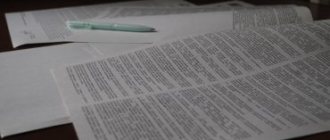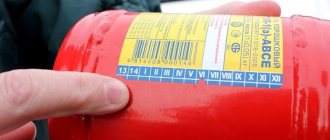Common reasons for water outages
Water stops flowing into housing for various reasons. Sometimes the reason for this may be the owner of the apartment, house, and so on.
For example: if the owner does not pay for water consumption or has unauthorizedly connected to the water supply system.
Read our article on how to register them after installing meters.
There are other factors affecting water supply:
- water supply reconstruction,
- renovation work,
- preventive work,
- repair or replacement of system parts.
Preventative work is carried out in the summer, as well as in advance of the onset of winter and a drop in air temperature, in order to check the water supply system.
During this period, water may be turned off for a long time.
Sometimes water supply may be stopped if local authorities .
Emergency shutdown
In the event of an emergency, water stops flowing immediately to reduce negative consequences and promptly resolve the problem. Utilities must carry out repairs and restore supply within a couple of hours. This takes all my strength. The estimated time for troubleshooting problems in the water supply system is established in SNiP 2.04.02-84.
Emergency shutdown of water supply is carried out not only in case of pipeline breaks and simple violations of its transportation system. Another factor in this could be a serious decline in the quality of drinking water.
In this situation, it is also turned off until the fault is resolved. This is quite reasonable, because it concerns people's health.
In emergency mode, water supply is cut off when extinguishing fires, to which huge water resources are redirected. Most fires are put out quite quickly, so people don't get upset.
A separate process in case of problems with water supply is the supply of drinking liquid. It is delivered by tanker trucks in quantities that meet the water consumption standards for people. A specific delivery time has not been established. However, there are some rules that help reduce the discomfort of the population.
ATTENTION! If the shutdown of cold water is in effect as planned, then notified people make certain supplies at home.
In this situation, special tanks are redirected to the site only if repair, restoration or preventive manipulations are delayed for a long time. In an accident, everything happens differently. If the emergency situation is not resolved within a couple of hours, then liquid is supplied to ensure current consumption.
How long can you legally turn off water?
In order to carry out certain work on the water supply line, specialized organizations have a limited amount of time.
Read about the timing of replacement and verification of water meters in this article.
Cold water
Appendix 1 to the Decree of the Government of the Russian Federation dated May 6, 2011 No. 354. Cold water can be turned off for no more than 4 hours at a time and no more than 8 hours in total per month. But only if an emergency occurs in the central water supply system.
Persons responsible for water supply are obliged to eliminate the breakdown as quickly as possible.
If water is turned off for longer periods and without justified reasons, the consumer may, referring to the resolution, demand to recalculate the amount of payment for water supply.
Hot water
Hot water is turned off in the summer as if by tradition . But besides summer, outages also occur at other times of the year.
Decree of the Government of the Russian Federation No. 354 of 05/06/2011. The service provider can turn off the hot water :
- for 4 hours at a time and for 8 hours in total in one month. In case of an emergency, continuously for 24 hours,
- during preventive maintenance, the interruption in the supply of hot water should not exceed 14 days.
Read here how to check utility bills for accuracy.
All these standards are prescribed in the legislation of the Russian Federation on technical regulation (SanPiN 2.1.4.2496-09).
How long can cold water be turned off?
— Permissible duration of heating interruption: no more than 24 hours (in total) within one month; no more than 16 hours at a time - at an air temperature in residential premises from 12 degrees C to standard; no more than 8 hours at a time – at an air temperature in residential premises from 10 degrees C to 12 degrees C; no more than 4 hours at a time - at an air temperature in residential premises from 8 degrees C to 10 degrees C.
This is interesting: The Law On Shares in an Apartment in 2020
How can you turn off the water in one apartment and not affect the other residents of the apartment building? The best option is to weld the pipe in the owner’s apartment. But without his permission it will be impossible to get there. And few people will voluntarily allow housing office representatives into their apartment to carry out such manipulations. You can also block the owner's riser in the basement. In this case, utility companies will suffer certain damage, which will then be recovered from the defaulter. So, if the case goes to court, this amount will also be added to the debt.
Should there be warnings about shutdowns?
In almost all cases, housing office employees must warn that water supply will be interrupted for some time.
The population is notified in the local media and by posting notices at the entrances of houses that are disconnected from the water supply.
Warn:
- When shutting down according to plan . Warn 30 days in advance
- In case of debt . They give a month's notice. Only hot water is turned off (Resolution of the Government of the Russian Federation dated May 23, 2006 No. 307). The warning to the debtor comes with a receipt,
- an illegal connection is detected ,
- When the service provider receives an order to stop water supply from local or state authorities .
The debtor is given time to repay the debt and tries to make concessions.
Read in this article what to do after receiving an order to collect debts for utility bills.
Legislative basis for shutting off hot water
Hot water supply is the supply of water at a set temperature to premises with residential, industrial or commercial purposes to meet household needs, as well as heating.
Hot water supply (DHW) can be local, citywide or centralized. In the first case, the supply of water at elevated temperatures is ensured by the operation of a city-wide boiler house or the secondary circuit of a power plant. Water is supplied throughout the entire settlement, to almost all houses.
In the second case, the supply of water at elevated temperatures is carried out through the operation of the local boiler house. Such equipment is designed for smaller volumes than with centralized supply. Water heating is provided by electric or gas boilers. In a similar way, hot water supply can be provided to one apartment building or several. However, the system and equipment are not designed for heavy loads; the water supply itself is supplied several tens of meters around.
Regardless of the method of providing hot water supply to residents, supplying hot water to apartment buildings, for heating purposes or to meet household needs, is a nationwide practice, therefore all service providers must adhere to the requirements established by federal legislation. The basis for regulatory regulation of the hot water supply sector is the following regulations:
- rules and regulations for the operation of housing stock. This regulatory act was approved by a resolution of the State Construction Committee on September 27, 2003. It contains rules for carrying out repair work in the summer. According to the requirement, all activities related to ensuring the proper functioning of heating networks must be carried out simultaneously, and they should not last more than 14 days in total. In this case, the organization carrying out the repairs has the right to independently determine the duration of the repair work. But they must not exceed the maximum period established by law;
- SanPin 2.14.2496-09 dated 04/07/2009. This regulatory act contains the requirement that work related to stopping the supply of hot water supply cannot exceed a total duration of fourteen days. It has also been established that organizations that have a status of increased epidemiological significance, for example, medical, educational organizations, and boarding homes, must be supplied from backup sources during the entire period of planned shutdown of hot water supply. Such a possibility should be provided at the design stage of hot water supply networks.
If there is an interruption in the supply of services that exceeds the established duration, the payment for utilities must be recalculated and reduced by the cost of the supply not provided.
The above rules contain the following requirements that must be met by hot water supply supplied to citizens and organizations:
- water supply must be provided uninterruptedly and around the clock throughout the entire calendar year;
- deviations in the temperature of the supplied water should not exceed 5 degrees Celsius at night, 3 degrees Celsius during the day;
- water quality must meet the requirements of the above SanPin;
- the pressure in the DHW network should not be less than 0.03 MPa.
There is liability for violating the standards established to provide hot water supply to citizens.
When can cold and hot water be turned off without warning?
Without warning the consumer about the shutdown, water supply may be interrupted by:
- in case of an emergency with equipment or water supply system,
- in case of emergency or natural disaster.
An emergency situation also arises due to improper care of the plumbing fixtures inside the consumer’s home. For example, a faucet broke or a pipe burst.
In this case, if the consumer is not at home or for some reason cannot eliminate the leak, if there is a threat of flooding of neighbors, then the riser is closed .
Where to call?
Having discovered that the water supply has been stopped, you should not panic, but you just need to know who to contact for clarification and elimination of the problem with the water supply.
If the house is managed by a management company, then you can find out the reason for the lack of water or report other problems with it by calling the dispatcher .
If the HOA is present in the house, you can call the chairman of the association.
The payment receipt also contains phone numbers where you can contact and get answers to questions about water supply. In all cities there is an emergency dispatch service , which can also provide explanations.
Deadlines
Time limits are established by law for planned and emergency water supply outages. During one month, the client can be left without water for a total of no more than eight hours.
The maximum limit for one outage is four hours. This applies to all planned manipulations.
In the event of an accident, water companies must correct the problems within a short period of time. In this situation, the time standards will be different; they will depend on the complexity of the emergency situation, the depth of the pipelines, and so on.
If the planned shutdown of water supply takes longer than usual, this indicates an inadequate quality of the services provided. There is no need to think about when the water will be given and the water supply will be turned on; in this situation, you have the right to demand that the company recalculate payment for services.
Not only is it considered a violation of the agreement on the supply of drinking water to the premises if it is turned off beyond the established time frame. This can also include a decrease in pressure in the pipes. If it drops by 20% or more, then this also becomes a reason to recalculate the payment in terms of reducing it.
ATTENTION! The client must constantly pay water bills; for violations, he is punished with penalties and fines. At the same time, the company receives a share of responsibility for the quality of services provided.
If you're wondering. why the cold water was turned off, know that there is an answer to this question. All water supply shutdowns must have a reason and the process must be carried out in a certain order, otherwise the company will also face fines. There is a list of cases in which turning off water is considered illegal:
- Planned technical manipulations are being carried out, but residents have not received the necessary preliminary messages;
- the water supply was shut off for debt, even if there was a debt. As has already been said, no one should have their drinking water turned off. To deal with debtors, companies must use other methods, for example, accrue penalties and fines, apply to the courts, and limit the provision of other services;
- unreasonable termination of water supply or decrease in pressure;
- delay in turning on the water supply after the faults have been corrected. That's the whole list.
Read more Submitting documents to the tax office if you bought a vegetable garden
Where to complain if the management company does not respond to turning off the water?
In the event that there is no water supply, and the management company does not react in any way to this situation, then it is important to know that there are higher authorities above the management company that control their work (Articles 13 and 20 of the Housing Code and Procedure No. 170) . The inappropriate work of the management company will then be dealt with by :
- District administration,
- housing and communal services management,
- housing inspection,
- Rospotrebnadzor,
- local prosecutor's office.
Read in the next article how utility bills are calculated based on the number of registered or resident residents.











